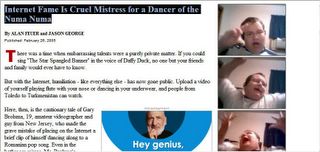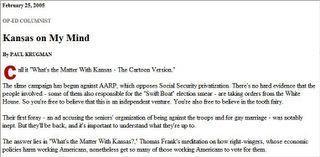
Last year Peter Gosselin of the LA Times wrote a 3-part series that tackled a subject that's probably the key economic story of the past 30 years: the steadily increasing risk and income volatility of the American middle class
WTC7 seems to be a classic controlled demolition. WTC 1 &2 destruction appears to have been enhanced by thermate (a variation of thermite) in addition. Pentagon was not struck by a passenger aircraft. It was a drone or missle.

But with the Internet, humiliation - like everything else - has now gone public. Upload a video of yourself playing flute with your nose or dancing in your underwear, and people from Toledo to Turkmenistan can watch. Here, then, is the cautionary tale of Gary Brolsma, 19, amateur videographer and guy from New Jersey, who made the grave mistake of placing on the Internet a brief clip of himself dancing along to a Romanian pop song. Even in the bathroom mirror, Mr. Brolsma's performance could only be described as earnest but painful.
His story suggests that the quaint days when cultural trinkets, like celebrity sex tapes, were passed around like novels in Soviet Russia are over. It says a little something of the lightning speed at which fame is made these days.
To begin at the beginning:
Mr. Brolsma, a pudgy guy from Saddle Brook, made a video of himself this fall performing a lip-synced version of "Dragostea Din Tei," a Romanian pop tune, which roughly translates to "Love From the Linden Trees." He not only mouthed the words, he bounced along in what he called the "Numa Numa Dance" - an arm-flailing, eyebrow-cocked performance executed without ever once leaving the chair.
In December, the Web site newgrounds.com, a clearinghouse for online videos and animation, placed a link to Mr. Brolsma on its home page and, soon, there was a river of attention. "Good Morning America" came calling and he appeared. CNN and VH1 broadcast the clip. Parodists tried their own Numa Numa dances online. By yesterday, the Brolsma rendition of "Love From the Linden Trees" had attracted nearly two million hits on the original Web site alone.
The video can be seen here.
It was just as Diane Sawyer said on her television program: "Who knows where this will lead?"
Nowhere, apparently. For, in Mr. Brolsma's case, the river became a flood.
He has now sought refuge from his fame in his family's small house on a gritty street in Saddle Brook. He has stopped taking phone calls from the news media, including The New York Times. He canceled an appearance on NBC's "Today." According to his relatives, he mopes around the house.
What's worse is that no one seems to understand.
"I said, 'Gary this is your one chance to be famous - embrace it,' " said Corey Dzielinski, who has known Mr. Brolsma since the fifth grade. Gary Brolsma is not the first guy to rocket out of anonymity on a starship of embarrassment. There was William Hung, the Hong Kong-born "American Idol" reject, who sang and danced so poorly he became a household name. There was Ghyslain Raza, the teenage Québécois, who taped himself in a mock light-saber duel and is now known as the Star Wars Kid.
In July 2003, Mr. Raza's parents went so far as to sue four of his classmates, claiming they had placed the clip of him online without permission. "Ghyslain had to endure and still endures today, harassment and derision," according to the lawsuit, first reported in The Globe and Mail of Toronto.
Mr. Brolsma has no plans to sue, his family said - mainly because he would have to sue himself. In fact, they wish he would bask a little in his celebrity.
"I don't know what's wrong with him," his grandfather, Kalman Telkes, a Hungarian immigrant, said the other day while taking out the trash.
The question remains why two million people would want to watch a doughy guy in glasses wave his arms around online to a Romanian pop song.
"It definitely has to be something different," said Tom Fulp, president and Webmaster of newgrounds.com.
"It's really time and place."
"The Numa Numa dance," he said, sounding impressed. "You see it and you kind of impulsively have to send it to your friends."
There is no way to pinpoint the fancy of the Internet, but in an effort to gauge Mr. Brolsma's allure, the Numa Numa dance was shown to a classroom of eighth graders at Saddle Brook Middle School - the same middle school that he attended, in fact.
The students' reactions ranged from envious to unimpressed. "That's stupid," one of them said. "What else does he do?" a second asked. A third was a bit more generous: "I should make a video and become famous."
The teacher, Susan Sommer, remembered Mr. Brolsma. He was a quiet kid, she said, with a good sense of humor and a flair for technology.
"Whenever there were computer problems, Gary and Corey would fix them for the school," she said.
His friends say Mr. Brolsma has always had a creative side. He used to make satirical Prozac commercials on cassette tapes, for instance. He used to publish a newspaper with print so small you couldn't read it with the naked eye.
"He was always very out there - he's always been ambitious," said Frank Gallo, a former classmate. "And he's a big guy, but he's never been ashamed."
Another friend, Randal Reiman, said: "I've heard a lot of people say it's not that impressive - it doesn't have talent. But I say, Who cares?"
These days, Mr. Brolsma shuttles between the house and his job at Staples, his family said. He is distraught, embarrassed. His grandmother, Margaret Telkes, quoted him as saying, just the other day, "I want this to end."
And yet the work lives on. Mr. Fulp, the Webmaster, continues to receive online homages to the Numa Numa dance. The most recent showed what seemed to be a class of computer students singing in Romanian and, in unison, waving their hands.
Mr. Reiman figures the larger world has finally caught on to Gary Brolsma.
"He's been entertaining us for years," he said, "so it's kind of like the rest of the world is realizing that Gary can make you smile."

